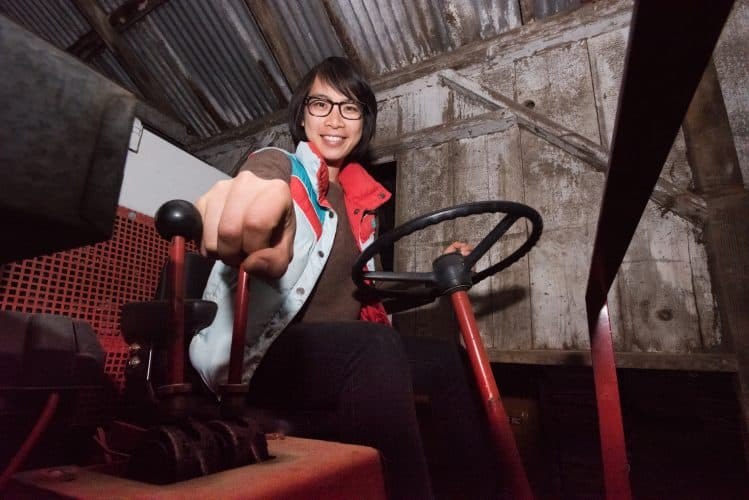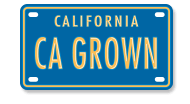Meet a Farmer: Mai Nguyen of Farmer Mai

Meet Mai Nguyen, Founder and Owner of Farmer Mai in Upper Lake, California. After studying climate research in college, she got tired of documenting the ways we’re harming the planet and decided to actively help make a difference.
Learn more about Mai, why she’s so passionate about providing the community with nutritious food using environmentally friendly methods and why she loves to interact with her customers.
CA GROWN: Tell me about the history of the company and what your role is.
Mai: I run my own farm business and I started out by growing organic heritage grains and Southeast Asian crops. For the past year and a half now, I’ve been concentrating on the grain portion of it because I had a major accident while doing a delivery, so I can’t really do row crops anymore. I’m doing what I can off the farm as well to do a lot of public education about heritage and whole grains and why locally-grown grains are important.
CA GROWN: What does a typical day look like for you?
Mai: Every day is incredibly different. I’m just getting out of the spring planting craziness, so during that time I’m frequently and feverishly checking the weather because I dry farm, so I rely solely on rainfall for my irrigation. It’s a process of waking up and checking the forecast, then going out to the field to check the soil conditions and moisture. In more recent years, the weather has been harder to predict for spring plantings. If the timing is right, then I try to get all of the seed ready and loaded in the feed drill. No matter how much you prepare, inevitably something happens in the field like you get stuck or some spots are more wet than others. So a typical day probably involves some type of repair work on the machinery and then getting it up and running again before the weather changes.
CA GROWN: What drew you into the farming profession?
Mai: I studied climate research during my undergrad and I created a lot of climate models and went out to do field work. I was very interested in our entire environment and how it’s changing. I came to realize that I was more social than I thought I was, so I wanted to get out of doing remote field work and really went deep into social-related work like disaster management and working in refugee camps. I got interested in the two big issues we face as a global society; climate change and social inequality. I started to ask myself “what could I do in my life that would address both?” Farming made sense because it’s the main way that we transform the landscape in terms of production and I wanted to grow food that is healthy for people. I wanted to have these whole grains and crops that are culturally desirable and a diversity of crops that reflects the diversity of California. Being in this agriculture world, talking to other farmers and finding ways to collaborate and discuss different farming practices, those are huge parts of what drew me into the profession and keep me here.
CA GROWN: What are some ways your company gives back to the community?
Mai: The way that I farm and interact with customers gives back to the community because it’s important to me to have a direct relationship with customers so that they understand where and how their food was produced, the ethics and the process behind it. I’ve found that people have been so grateful to interact with someone who’s providing them and their family with food. Also, a lot of the people who buy from me either have had or know someone who’s had a diet-related illness, usually diabetes, and had a hard time finding whole grains. Another way is in the ethos of it because social justice is important to me. When I’ve had to hire people, I make sure I pay them very fairly so they can have a living wage. Beyond that, there’s the educational campaign that I’ve been running to inform people about the benefits of whole grains and where they can get it. In this way, I’ve been connecting with a lot of green farmers, bakers, chefs, customers and this whole grain economy. Finally, I do have an off-farm job at the California Center for Cooperative Development and I help farmers find cooperative solutions to common problems. I also help a lot of beginning farmers who are refugees, immigrants or young farmers who might not have the capital to buy their own farmland. I help them create a worker cooperative business with the right people so they can come together to combine their finances and farming skills to create their own farm. I enjoy giving back to the farming community like this because it enables more farmers to be out there. I’m also the Chair of the Asian American Farmers Alliance and help AAPI farmers gain technical assistance, seed and advocacy through peer collaboration.
CA GROWN: What are your hobbies or pastimes when you’re not farming?
Mai: I’m still trying to get better after that accident, so I do a lot of yoga and I also really love doing a lot of things around food, like food preservation in traditional Vietnamese methods and sharing that with other people.
CA GROWN: What’s the most rewarding part of your job?
Mai: It’s definitely seeing people relish in the food that I grow. One time, I was doing an educational thing and there was some bread made from my grains and this 89-year-old woman had a sample of the bread and she said it was the best bread she had ever had in her entire life. She’s eaten a lot of bread in her life, so her saying mine is the best is great to hear. All those stressful times during planting and harvesting are so worth it when you see people enjoying your food like that.
CA GROWN: What advice would you give to someone who wants to become a farmer?
Mai: Always have a plan but also be flexible with your plan so you can roll with the punches. I think it’s important to have really strong business skills and be willing to ask a lot of questions and be humble. If you ask more questions, you get a lot of perspectives and you can learn from their experiences and build that into the planning of your farm.
CA GROWN: What has contributed to your past success and what are you doing to ensure success going forward?
Mai: I wouldn’t have been able to start my business if a lot of different people didn’t share my values. I know farming is a business and you have to have a lot of legal and financial pieces in place, but I think there’s still a place for your values and heart to be in there. I’ve received a lot of support from people when I first started because they shared the same values as I did and throughout the process, I’ve been successful in bringing something to market that isn’t just a commodity, but it’s actually a good value that people want to invest in. I’ve decided to do more public outreach and I speak at conferences now and I’ve been more responsive to the media. I think my success has been related to the way I inform people about what’s going on because the more they know, the more they value the food and the labor that goes into it.
CA GROWN: As a California farmer, we know that you have a long list of activities you undertake on your farm to care for the land and its resources. What are one or two ways that you’re most proud of or you feel are innovative ways you care for your land?
Mai: I try to produce as much on site as possible and it’s because my background for a while in my graduate studies was waste management and so a large part of how I view systems is how I can recycle things. I’ve brought in animals to do as much work as possible instead of fossil fuel-based equipment. For example, I’ll bring in sheep to do the mowing because they’re simultaneously getting rid of weeds and fertilizing. All the things I do really aren’t much more time or energy than bringing out a tractor, but at least it means that I won’t have the inevitable oil spill in the field or something. So by using animals as much as possible and growing these heritage grains that have these really long stalks that are basically carbon sequestered from the atmosphere as opposed to modern varieties, I’m doing my part. I also don’t use any sprays and chemicals like herbicides and pesticides at all. Finally, even though I have a really small acreage, I work with a lot of farmers and do a lot of consulting to get advice on land management and by experimenting on my own property to find out what does and doesn’t work, it’s something I can share with others so that they can also implement ecologically mindful practices on their farm as well.
